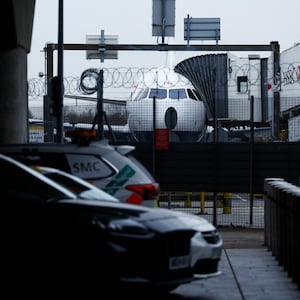Business
Major European Airports Face Cyber Disruption, Flights Delayed

Major airports in Europe, including Heathrow in London, Berlin, and Brussels, experienced significant disruptions due to a cyber attack affecting automated systems. The incident impacted electronic check-in and baggage drop operations, leading to widespread delays and potential flight cancellations.
On October 4, 2023, airport service provider Collins Aerospace confirmed the cyber-related disruption, stating, “We have become aware of a cyber-related disruption to our Muse software in select airports.” This incident not only caused inconvenience for travelers but also highlighted vulnerabilities in critical aviation infrastructure.
According to reports, at least three major European air hubs were affected, prompting warnings of delays. Collins Aerospace emphasized that the disruption primarily impacted electronic customer check-in and baggage drop processes. The company reassured that operations could continue through manual check-in methods, thus minimizing the overall impact on air travel.
Impact on Travelers and Operations
Travelers at the affected airports faced long queues and considerable waiting times as manual check-in procedures were implemented. The situation stressed both airport staff and passengers, with many expressing frustration over the delays.
The disruptions came during peak travel hours, exacerbating the situation as numerous flights were scheduled for departure. Passengers reported on social media that their flights were delayed, with some even experiencing cancellations. Collins Aerospace’s quick response to mitigate the impact through alternative check-in methods likely helped alleviate some of the chaos.
Broader Implications for Airport Security
This incident raises concerns about cybersecurity measures in place at major airports. As travel resumes to pre-pandemic levels, the reliance on technology for efficient operations has increased, making them more vulnerable to cyber threats.
Experts note that incidents like this underline the importance of robust cybersecurity protocols within the aviation sector. The reliance on automated systems for essential functions such as check-in and baggage handling necessitates ongoing investment in cybersecurity to protect against future threats.
As investigations continue into the source and extent of the attack, authorities and airport management are likely to review existing security measures. Ensuring the safety and efficiency of air travel remains a top priority for both airport operators and regulatory agencies.
The situation at Heathrow, Berlin, and Brussels serves as a reminder of the interconnectedness of modern travel and the potential risks posed by cyber attacks. As the aviation industry adapts to these challenges, the focus will be on strengthening defenses to safeguard against future disruptions.
-

 Sports2 months ago
Sports2 months agoNetball New Zealand Stands Down Dame Noeline Taurua for Series
-

 Entertainment2 months ago
Entertainment2 months agoTributes Pour In for Lachlan Rofe, Reality Star, Dead at 47
-

 Entertainment4 weeks ago
Entertainment4 weeks agoNew ‘Maverick’ Chaser Joins Beat the Chasers Season Finale
-

 Sports6 days ago
Sports6 days agoEli Katoa Rushed to Hospital After Sideline Incident During Match
-

 Sports2 months ago
Sports2 months agoSilver Ferns Legend Laura Langman Criticizes Team’s Attitude
-

 Politics1 month ago
Politics1 month agoNetball NZ Calls for Respect Amid Dame Taurua’s Standoff
-

 Entertainment2 months ago
Entertainment2 months agoKhloe Kardashian Embraces Innovative Stem Cell Therapy in Mexico
-

 Sports4 days ago
Sports4 days agoJamie Melham Triumphs Over Husband Ben in Melbourne Cup Victory
-

 World3 months ago
World3 months agoPolice Arrest Multiple Individuals During Funeral for Zain Taikato-Fox
-

 Sports3 months ago
Sports3 months agoGaël Monfils Set to Defend ASB Classic Title in January 2026
-

 Entertainment1 month ago
Entertainment1 month agoTyson Fury’s Daughter Venezuela Gets Engaged at Birthday Bash
-

 Sports1 month ago
Sports1 month agoHeather McMahan Steps Down as Ryder Cup Host After Controversy




















